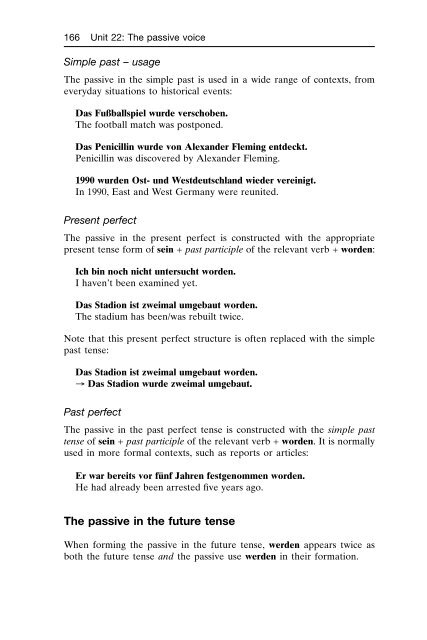Intermediate german
You also want an ePaper? Increase the reach of your titles
YUMPU automatically turns print PDFs into web optimized ePapers that Google loves.
166 Unit 22: The passive voice<br />
111<br />
2<br />
3<br />
4<br />
5<br />
6<br />
7<br />
8111<br />
9<br />
1011<br />
1<br />
2<br />
3<br />
4<br />
5<br />
6<br />
7<br />
8<br />
9<br />
2011<br />
1<br />
2<br />
3<br />
4<br />
5<br />
6<br />
7<br />
8<br />
9<br />
3011<br />
1<br />
2<br />
3<br />
4<br />
5<br />
6<br />
7<br />
8<br />
9<br />
4011<br />
1<br />
2<br />
3<br />
41111<br />
Simple past – usage<br />
The passive in the simple past is used in a wide range of contexts, from<br />
everyday situations to historical events:<br />
Das Fußballspiel wurde verschoben.<br />
The football match was postponed.<br />
Das Penicillin wurde von Alexander Fleming entdeckt.<br />
Penicillin was discovered by Alexander Fleming.<br />
1990 wurden Ost- und Westdeutschland wieder vereinigt.<br />
In 1990, East and West Germany were reunited.<br />
Present perfect<br />
The passive in the present perfect is constructed with the appropriate<br />
present tense form of sein + past participle of the relevant verb + worden:<br />
Ich bin noch nicht untersucht worden.<br />
I haven’t been examined yet.<br />
Das Stadion ist zweimal umgebaut worden.<br />
The stadium has been/was rebuilt twice.<br />
Note that this present perfect structure is often replaced with the simple<br />
past tense:<br />
Das Stadion ist zweimal umgebaut worden.<br />
→ Das Stadion wurde zweimal umgebaut.<br />
Past perfect<br />
The passive in the past perfect tense is constructed with the simple past<br />
tense of sein + past participle of the relevant verb + worden. It is normally<br />
used in more formal contexts, such as reports or articles:<br />
Er war bereits vor fünf Jahren festgenommen worden.<br />
He had already been arrested five years ago.<br />
The passive in the future tense<br />
When forming the passive in the future tense, werden appears twice as<br />
both the future tense and the passive use werden in their formation.



